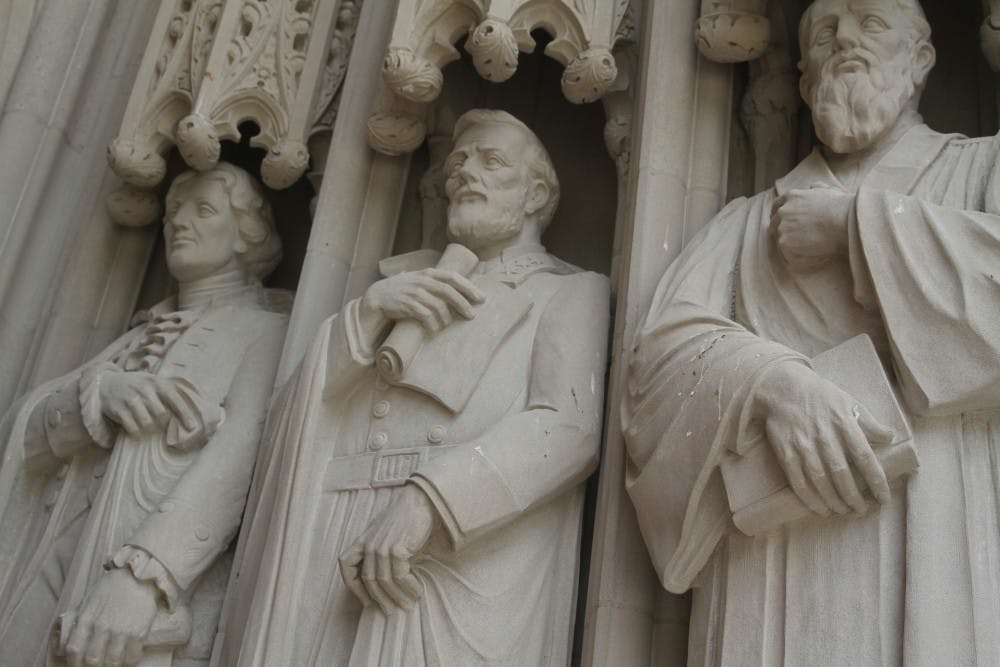Robert Wright Lee IV, M. Div. ‘17, is a descendant of Confederate Gen. Robert E. Lee. He is currently an adjunct professor at Appalachian State and a pastor at a United Church of Christ in Winston-Salem. The Chronicle spoke with him both before and after President Vincent Price’s decision to take down a statue of Lee outside Duke Chapel. This interview has been edited for length and clarity.
The Chronicle: What were your thoughts of the statue before it was taken down?
Robert Wright Lee IV: As a descendant of Robert E. Lee, my great, great, great, great uncle, it was always awkward for me to walk by the Chapel with my friends, with my family, because it has become a symbol of white supremacy and white nationalism. To see my ancestor used as that symbol was disgraceful—a disgrace to my family, a disgrace for all that we stand for and a disgrace to what I'm trying to do in ministry.
We want it to be a legacy of something that will never happen again. This can never be celebrated in any way. It was a horrific time in our nation's history. It was in the South and we have to remember that they owned people. In the end, that's something that we can never celebrate or commemorate. We can only work to make sure it never happens again.
I was taught at Duke Divinity School about idols and what we make of idols. We have made Robert E. Lee into an idol of white supremacy.
TC: What was your initial reaction to the removal of the statue?
RL: My initial reaction is relief. I can be proud of my University for what they've done. Many places are trying to discuss and just delay the response, when in reality we can move quickly. And it's obvious that Duke has moved quickly to take care of this issue and speak out against white supremacy.
TC: How do you think the decision to remove the statue in this way reflects President Price's leadership style?
RL: It obviously shows that he's not afraid to make tough decisions. I'm sure he's going to receive a lot of backlash for this, but I want to say that he has the support of the Lee family and our side of the family is very proud of this decision.
TC: What are your thoughts on Price's proposal to create a commission to study the role of memory and history at Duke?
RL: I think that's a great way to do it. It's what I was hoping would happen. I don't want these statues to come down and thrown away because they obviously represent something and we have to study what that means and how that plays into what is going on in our world, so we can make sure that those statues never come back up. I think it's appropriate that the Robert E. Lee statue isn't going to be destroyed or dismantled because this is an opportunity to educate people.
TC: How has your family reconciled with the history of your ancestor and his legacy?
RL: What we're doing right now to reconcile with that legacy is to speak up and speak out. We think that it is time to do something about this—it’s past time. It's time for us to listen to voices of color who are in our community and say that they have a place at the table as much as white people do in this conversation, if not more so.
When I asked why I was named what I was named, [my parents and I] talked a long time about it. We talked about what it means to be a person of color in this country. We have no ideas the hardships that they face, as white people. As the Lee family, we have no idea what they face. But, we do know that we can make a difference through our voices and through our activism and through what we say and what we do. My wife, Stephanie and I are certainly committed to making a difference in this world because of the Lee name. She came into the family and it was one of those things that we had this conversation: What does it mean to be a Lee in the 21st century? It's certainly different than being a Lee in the 19th century. It means standing up, speaking out. It means standing against hate and embracing those who are not like us based on the color of their skin and instead, celebrating God's future for us all in which we all be reconciled to each other and to God himself.
Get The Chronicle straight to your inbox
Signup for our weekly newsletter. Cancel at any time.
Class of 2019
Editor-in-chief 2017-18,
Local and national news department head 2016-17
Born in Hyderabad, India, Likhitha Butchireddygari moved to Baltimore at a young age. She is pursuing a Program II major entitled "Digital Democracy and Data" about the future of the American democracy.

